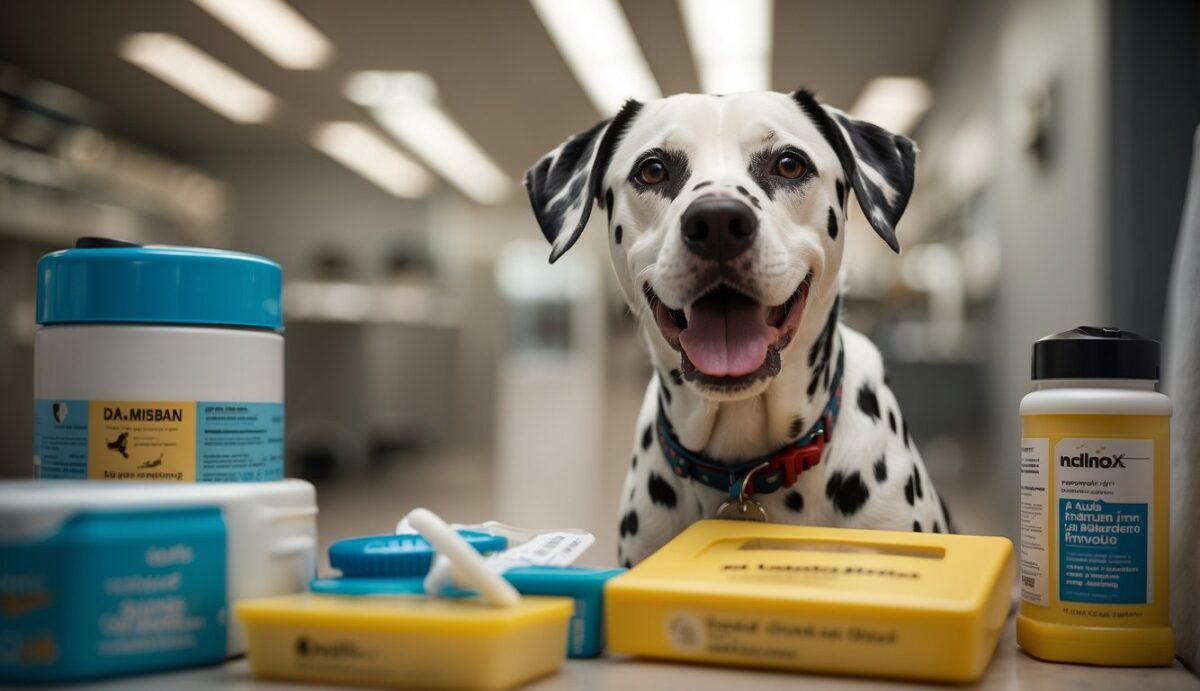Dalmatians are known for their distinctive spots and energetic demeanor, but like all dogs, they’re susceptible to various parasites, including fleas, ticks, and worms. These pests are more than just an annoyance; they can cause serious health issues for your Dalmatian, ranging from mild irritation to severe diseases.
Protecting your dog involves understanding the risks and implementing a consistent prevention strategy to ensure their health and happiness.
The prevention of parasites is crucial and manageable with the right knowledge and resources. A multi-faceted approach, including regular check-ups, proper grooming, and preventative medications, can greatly reduce the risk of your Dalmatian falling prey to these common parasites.
By remaining alert to the signs of infestation and staying informed about the latest prevention techniques, you can effectively guard your companion against these unwanted visitors.
Key Takeaways
- Regular preventative measures are essential for your Dalmatian’s health.
- Early detection and treatment of parasites minimize potential health risks.
- Staying informed on prevention and treatment options aids in responsible dog ownership.
Understanding Parasites in Dogs

When it comes to your Dalmatian’s health, staying informed about parasites is crucial. These pesky invaders can pose serious health risks, but with early detection and proper prevention, you can keep your dog happy and healthy.
Types of Parasites
Parasites that affect dogs come in two main categories: external and internal.
- External Parasites:
- Fleas: Small, jumping insects that feed on blood, causing itching and skin problems.
- Ticks: Arachnids that attach to the dog’s skin, potentially transmitting diseases like Lyme disease.
- Mites: Microscopic parasites that can cause mange, leading to skin irritation and hair loss.
- Lice: Insects that live on the skin, feeding on skin debris.
- Internal Parasites:
- Heartworms: Transmitted by mosquitoes, they live in the blood vessels of the heart and lungs.
- Intestinal worms: Includes roundworms, tapeworms, whipworms, and hookworms that live in the gastrointestinal tract.
Risks of Parasitic Infections
Parasitic infections can lead to a variety of health problems for dogs:
- Heartworm Disease: Can result in severe lung disease, heart failure, other organ damage, and even death.
- Lyme Disease: Transmitted by ticks, can cause fever, lameness, swollen joints, and kidney damage.
- Intestinal Worm Infections: Can lead to weight loss, diarrhea, and anemia.
Signs and Symptoms of Infestation
Keep an eye out for the following symptoms that can indicate a parasite infestation:
- Flea Infestation: Excessive scratching, red or irritated skin, and the presence of small dark specks (flea dirt) in the fur.
- Tick Presence: Check your dog regularly for ticks, especially after walks in wooded areas.
- Heartworm Symptoms: A mild persistent cough, reluctance to exercise, fatigue after moderate activity, decreased appetite, and weight loss.
- Worms: Vomiting, diarrhea, weight loss, an overall poor appearance, and evidence of worms in stool or around the dog’s rear.
Preventive Measures for Dog Owners

Ensuring your Dalmatian lives a happy, healthy life free from parasites involves taking proactive steps. Regular visits to the vet, maintaining a clean environment, and proper personal care can make all the difference.
Regular Vet Check-Ups
Your Dalmatian’s health largely depends on consistent check-ups with a veterinarian. These visits are crucial for early detection and prevention of parasites.
Your vet can recommend specific preventive medications that fit your dog’s age, weight, and lifestyle. This might include monthly oral medications for heartworms or topical treatments for fleas and ticks.
- Annual Check-ups: At least once a year, ensure your dog gets a full physical examination.
- Parasite Testing: Request tests for common parasites, like heartworm or tick-borne diseases.
Environmental Control
The places where your dog plays and relaxes can harbor parasites. Regularly clean and monitor these areas to reduce the risk of infestation.
- Grass and Woods: Regularly trim the grass and clear the brush in your yard to minimize flea and tick habitats.
- Home Cleanliness: Vacuum carpets and wash your dog’s bedding in hot water.
Maintaining a clear environment reduces the likelihood of your Dalmatian encountering fleas and ticks. Products like flea collars could also add a layer of protection.
Personal Care and Hygiene
Personal care for your Dalmatian includes baths with flea-preventive shampoos and regular grooming. This not only helps to spot any parasites early but also improves your dog’s overall skin health.
- Grooming: Brush your Dalmatian frequently to check for fleas or ticks.
- Bathing: Use vet-approved flea and tick shampoos periodically, especially after outings in high-risk areas.
If your pet shows signs of a flea allergy or discomfort, contact your veterinarian promptly for a suitable treatment plan.
Specific Parasite Prevention Techniques

Keeping your Dalmatian parasite-free is essential to their health and well-being. With a few focused strategies, you can protect your furry friend from fleas, ticks, and various worms that threaten their daily comfort and health.
Flea Prevention and Control
Fleas can cause severe discomfort and health issues such as skin infections and even tapeworms if swallowed by your pet:
- Topical Treatments: Apply monthly medications directly to your Dalmatian’s skin for effective flea prevention.
- Flea Collars: These can provide long-term protection and work well to repel fleas before they settle on your dog.
- Year-round Prevention: Even during the colder months, it’s crucial to maintain flea control, as fleas can survive indoors.
Tick Prevention and Strategies
Ticks can transmit diseases, including Lyme disease, so it’s vital to prevent these parasites:
- Tick Collars: Wearable collars that repel and kill ticks can be particularly effective against tick infestations.
- Vaccinations & Medications: Although not all tick-borne diseases can be prevented with a vaccine, regular veterinary care and preventive medications can significantly reduce the risk.
Worm Prevention Tactics
Different types of worms can affect your Dalmatian—heartworms, tapeworms, roundworms, hookworms, and whipworms:
- Heartworm Prevention: Monthly chewable tablets like Interceptor can prevent heartworms, which are transmitted by mosquitoes.
- Broad-spectrum Medications: Many products are designed to tackle several worm types at once, keeping your dog protected against a variety of parasites.
- Regular Veterinary Tests: Routine stool tests can detect the presence of worms early, making treatment much more straightforward.
Treatment and Management of Parasite Infestations

Addressing a parasite infestation promptly is vital for your Dalmatian’s health. You’re looking at two key strategies: immediate treatment to tackle the parasites and long-term management to prevent future issues.
Immediate Treatment Approaches
Once you suspect your Dalmatian has a parasitic infestation, a visit to your veterinarian is crucial. They will likely recommend the following:
Fleas and Ticks:
- Oral or topical medications that kill adult fleas and ticks
- Shampoos, sprays, or powders with insecticidal properties
Intestinal Worms (Tapeworms, Hookworms):
- Oral dewormers prescribed by your vet that specifically target the type of worm your dog has
Heartworms:
- A course of medications under a vet’s supervision, often requiring rest during treatment due to the severity of the condition
Ear Mites:
- Eardrops containing acaricides to eliminate mites
**Symptoms like vomiting or diarrhea may also be treated with supplementary medication to provide relief.
Long-Term Management
Preventing parasitic infestations is just as important as treating them. Consider these long-term care tips:
Flea and Tick Prevention:
- Monthly topical or oral preventatives that repel or kill these pests
- Environmental control, including regular cleaning and the use of home sprays
Preventing intestinal worms:
- Regular fecal exams to catch and treat infestations early
- Medications that control and prevent various types of worms
Heartworm Prevention:
- Monthly heartworm preventatives as prescribed by your vet are essential, especially in areas where mosquitoes are prevalent.
Monitoring for Lyme and Rocky Mountain Spotted Fever:
- Tick preventatives also play a role in reducing the risk of these diseases.
Understanding Zoonotic Risks

Before diving into Dalmatian care, it’s vital to recognize that some parasites can affect both your pet and your family. These risks, known as zoonotic risks, are important to manage for everyone’s health.
Parasites Transmittable to Humans
Fleas and ticks are the most common external parasites that can transfer from your Dalmatian to you.
Ticks can carry serious diseases such as Lyme disease and Rocky Mountain spotted fever.
Lyme disease is caused by the bacterium Borrelia burgdorferi and can lead to symptoms in humans ranging from fever and headache to severe joint pain and neurological problems.
Rocky Mountain spotted fever, caused by Rickettsia rickettsii, can result in similar symptoms but is often accompanied by a distinctive rash.
- Fleas: can transmit ailments like cat scratch disease to both humans and cats.
- Ticks: vectors for Lyme disease and ehrlichiosis, a bacterial illness that can cause fever and fatigue in humans.
Internal parasites like hookworms, which are a type of roundworm, can also pose a risk to humans, especially kids, who might accidentally ingest parasite eggs.
Hookworms can cause an itchy reaction called cutaneous larva migrans and in rare cases, can lead to more severe conditions.
| Parasite | Diseases in Humans | Transmission |
|---|---|---|
| Fleas | Cat scratch disease | Bites and scratches |
| Ticks | Lyme disease, Ehrlichiosis, Rocky Mountain spotted fever | Bites |
| Hookworms | Cutaneous larva migrans | Skin contact with contaminated soil |
Protecting Human Family Members
Prevention is paramount when protecting your household from zoonotic diseases.
Maintaining your Dalmatian’s health with regular vet visits and parasite prevention treatments is the first step.
Treatments such as topical ointments, oral medications, and collars are effective against fleas and ticks.
For internal parasites like hookworms:
- Ensure your Dalmatian is on a regular deworming schedule.
- Clean up feces promptly from your yard to reduce environmental contamination.
Personal hygiene plays a crucial role:
- Wash hands thoroughly after playing with your Dalmatian or handling their waste.
- Discourage kids from playing in areas where the dog or other animals may have defecated.
Product and Medication Information

When it comes to guarding your Dalmatian against parasites, several products are available, including oral medications, topical applications, and various devices.
Each has their pros and cons and effectiveness against fleas, ticks, and worms. Choose the protection that suits your dog’s lifestyle and health.
Oral Medications
Oral medications are a popular choice for preventing parasites in dogs. These are typically administered once a month:
- Bravecto: Provides up to 3 months of protection against fleas and ticks after just one dose.
- Interceptor Plus: Targets heartworm, roundworm, hookworm, tapeworm, and whipworm infections.
- Nexgard: Offers monthly protection from fleas and ticks, suitable for dogs who prefer a chewable tablet.
- Simparica: Another chewable that covers fleas, ticks, and multiple types of mites.
It’s important to note that heartworm prevention medications like Interceptor Plus and ProHeart often require a prescription from a veterinarian after a negative heartworm test.
Topical Treatments
Topical medications offer an alternative to oral treatments and are applied directly to your dog’s skin:
- Frontline: A common flea and tick preventive that’s applied between the shoulder blades.
- Advantage: Kills fleas within 24 hours and protects against further infestation for weeks.
These treatments are waterproof but always wait 24-48 hours after application before bathing your Dalmatian.
Collars and Other Devices
For continuous protection, consider these options:
- Seresto Collars: Provide up to 8 months of flea and tick protection and are a convenient choice for continuous coverage.
- Flea and Tick Tags: Devices that attach to your dog’s collar and emit a frequency that repels pests.
Keep in mind that while collars are practical, they may not be suitable for all dogs, especially those with sensitive skin or allergies. Always consult with your vet to find the most appropriate parasite prevention products for your Dalmatian.
Lifestyle and Environmental Considerations

When protecting your Dalmatian from parasites, your dog’s lifestyle and the environment they live in are crucial factors to consider. These aspects directly influence the type of prevention you’ll need to implement.
Indoor vs Outdoor Dogs
If your Dalmatian spends a lot of time indoors, flea infestations can still occur but may be less frequent.
Keeping a clean home and regularly washing your dog’s bedding can greatly reduce the risk.
Conversely, if your dog loves being outdoors, it’s essential to be vigilant, especially if they play in grass or woods where ticks and fleas are more prevalent.
- Indoor Prevention Tips:
- Regular vacuuming;
- Wash dog bedding weekly; and
- Use flea preventive products.
- Outdoor Prevention Strategies:
- Check for ticks daily;
- Maintain a tidy yard; and
- Avoid walking in tall grasses during flea season.
Impacts of Climate on Parasites
Parasites like fleas, ticks, and worms thrive in different climates.
For instance, warmer and humid conditions can extend the flea and mosquito seasons, increasing the risk of heartworm and flea-related diseases.
- Cool and Wet Climes:
- More slugs and snails can indicate a higher risk of lungworm; and
- Limit your dog’s exposure to these creatures.
- Warm and Humid Conditions:
- Increased flea and tick activity; and
- Year-round prevention measures may be necessary.
Keep in mind that ear mites can affect dogs regardless of the weather. Regular ear checks will help catch any signs of infestation early. Always consult with your vet to tailor parasite prevention to your Dalmatian’s specific environmental and lifestyle needs.
Common Myths and Misconceptions

Navigating through information on parasite prevention can be challenging, with various myths and misconceptions that may lead you astray. It’s important to separate fact from fiction to keep your Dalmatian safe and healthy.
Myths About Parasite Seasons
- Myth: “Flea and tick season ends with summer.”
Fact: Fleas and ticks can thrive in many climates beyond the summer months. Fleas often survive indoors during winter, and ticks can be active on warm days even in colder seasons. - Myth: “Heartworms are only a summer problem due to mosquitos.”
Fact: Although mosquitos are most prevalent in warmer seasons, they can live indoors and continue to transmit heartworm to dogs year-round.
Misunderstandings About Indoor Pets
- Myth: “Indoor Dalmatians don’t need parasite prevention.”
Fact: Even if your pet is primarily indoors, they can still be exposed to parasites like fleas, mites, and internal parasites. Fleas, for instance, can hitch a ride on clothing or other pets, and mites can be present in any environment. - Myth: “Cats don’t spread parasites to dogs.”
Fact: Cats can indeed carry and spread parasites like fleas to your Dalmatian, making prevention crucial even in multi-pet households.
Holistic and Alternative Approaches

Exploring holistic and alternative methods for parasite prevention in your Dalmatian can lead to fewer chemicals used and may align better with your overall approach to pet wellness.
Natural Remedies
Natural remedies for combating parasites like fleas, ticks, and worms often include the use of flea combs which can physically remove fleas and their eggs from your pet’s coat.
Regular grooming with such tools not only aids in detection but also in prevention.
- Diatomaceous Earth: Sprinkle food-grade diatomaceous earth on your pet’s coat and bedding to dehydrate and kill external parasites.
- Herbal Treatments: Certain herbs, such as neem, can be applied in the form of shampoos or sprays to repel parasites naturally, potentially preventing issues like hair loss and flea allergy dermatitis, a condition leading to intense itching and scaly skin.
Remember, while some herbs are safe, others can be toxic to dogs, so consult your vet before trying herbal remedies.
Dietary Considerations
What you feed your Dalmatian may impact their resilience against parasites. A balanced diet supports a strong immune system, which can help fend off the ill effects of parasites like intestinal worms and lungworm. These could lead to symptoms like vomiting and diarrhoea.
- Probiotics and Prebiotics: Enhance your dog’s gut health with these supplements to keep their immune system robust.
- Foods Rich in Antioxidants: Regularly include sources of antioxidants in your dog’s meals to help combat potential anaemia from parasites.
- Garlic: In very small amounts, garlic can act as a natural repellent against pests. Be cautious, as garlic can be very toxic if administered improperly or in large doses.
Always check the correct dosage and suitability of foods for your dog with a veterinary professional to prevent any adverse effects.
Key Takeaways for Responsible Dog Ownership

As a dog owner, your top priority is the health and well-being of your Dalmatian. Protecting your pet from parasites such as fleas, ticks, and worms is crucial to avoid a range of health problems. Here’s a friendly guide to effective prevention:
- Regular Vet Visits: Schedule routine check-ups with your vet. They can provide personalized advice and timely treatments to prevent parasite infestations.
- Preventive Treatments: Use recommended flea and tick prevention products. These might include topical solutions, oral medications, or collars designed to repel and kill pests.
- Good Hygiene:
- Bathing: Bathe your Dalmatian with vet-approved flea and tick shampoos.
- Grooming: Regularly groom your dog to check for fleas, ticks, or signs of infection.
- Home and Yard Care:
- Keep your yard free of debris and tall grasses where parasites could hide.
- Clean your dog’s kennel and resting areas frequently.
- Health Management: Treat any health problems promptly. If you spot symptoms like excessive scratching, patches of missing fur, or lethargy, consult your vet.
- Worm Prevention: Administer deworming treatments as recommended by your vet to protect against intestinal worms.
Frequently Asked Questions (FAQs)

Protecting your Dalmatian from parasites is crucial. These FAQs will guide you through safe prevention and treatment options for fleas, ticks, and worms.
What is the safest way to prevent parasites in dogs including fleas, ticks, and worms?
Your first line of defense against parasites is using a year-round, broad-spectrum preventive medication. Products that target multiple parasites simultaneously are often the safest and most convenient option.
How early can you start flea and tick prevention in puppies?
You can usually start flea and tick prevention for puppies as young as 8 weeks. Always check the specific product’s label for age recommendations before use to ensure the safety of your puppy.
What are the best flea and tick treatments for very young or small puppies?
For very young or small puppies, consult your veterinarian for the safest options. Topical treatments are commonly recommended, but the correct dosage is key to avoid potential harm due to a puppy’s sensitive developing system.
Can you recommend effective flea and tick preventatives for dogs?
For effective flea and tick preventatives, your vet can recommend products like oral tablets, topical applications, and collars designed for prolonged protection against these parasites.
What is the best overall flea treatment available for dogs?
The best overall flea treatment will depend on your dog’s specific needs and health status. Oral flea preventatives are popular for their efficacy and convenience, but your vet can help determine the most suitable option for your Dalmatian.
How often should I treat my dog to prevent common parasites like fleas and worms?
In general, treatment schedules may vary, but monthly applications are common for fleas and worms.
Always follow the instructions provided by the manufacturer and consult your veterinarian to tailor a prevention schedule for your dog’s lifestyle and risks.

